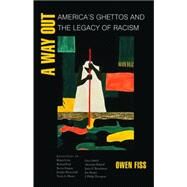A Way Out: America's Ghettos and the Legacy of Racism
, by Fiss, Owen M.; Cohen, Joshua; Decker, Jefferson; Rogers, Joel- ISBN: 9781400825516 | 1400825512
- Cover:
- Copyright: 9/2/2008
After decades of hand-wringing and well-intentioned efforts to improve inner cities, ghettos remain places of degrading poverty with few jobs, much crime, failing schools, and dilapidated housing. Stepping around fruitless arguments over whether or not ghettos are dysfunctional communities that exacerbate poverty, and beyond modest proposals to ameliorate their problems, one of America's leading experts on civil rights gives us a stunning but commonsensical solution: give residents the means to leave. Inner cities, writes Owen Fiss, are structures of subordination. The only way to end the poverty they transmit across generations is to help people move out of them--and into neighborhoods with higher employment rates and decent schools. Based on programs tried successfully in Chicago and elsewhere, Fiss's proposal is for a provocative national policy initiative that would give inner-city residents rent vouchers so they can move to better neighborhoods. This would end at last the informal segregation, by race and income, of our metropolitan regions. Given the government's role in creating and maintaining segregation, Fiss argues, justice demands no less than such sweeping federal action. To sample the heated controversy that Fiss's ideas will ignite, the book includes ten responses from scholars, journalists, and practicing lawyers. Some endorse Fiss's proposal in general terms but take issue with particulars. Others concur with his diagnosis of the problem but argue that his policy response is wrongheaded. Still others accuse Fiss of underestimating the internal strength of inner-city communities as well as the hostility of white suburbs. Fiss's bold views should set off a debate that will help shape urban social policy into the foreseeable future. It is indispensable reading for anyone interested in social justice, domestic policy, or the fate of our cities.







